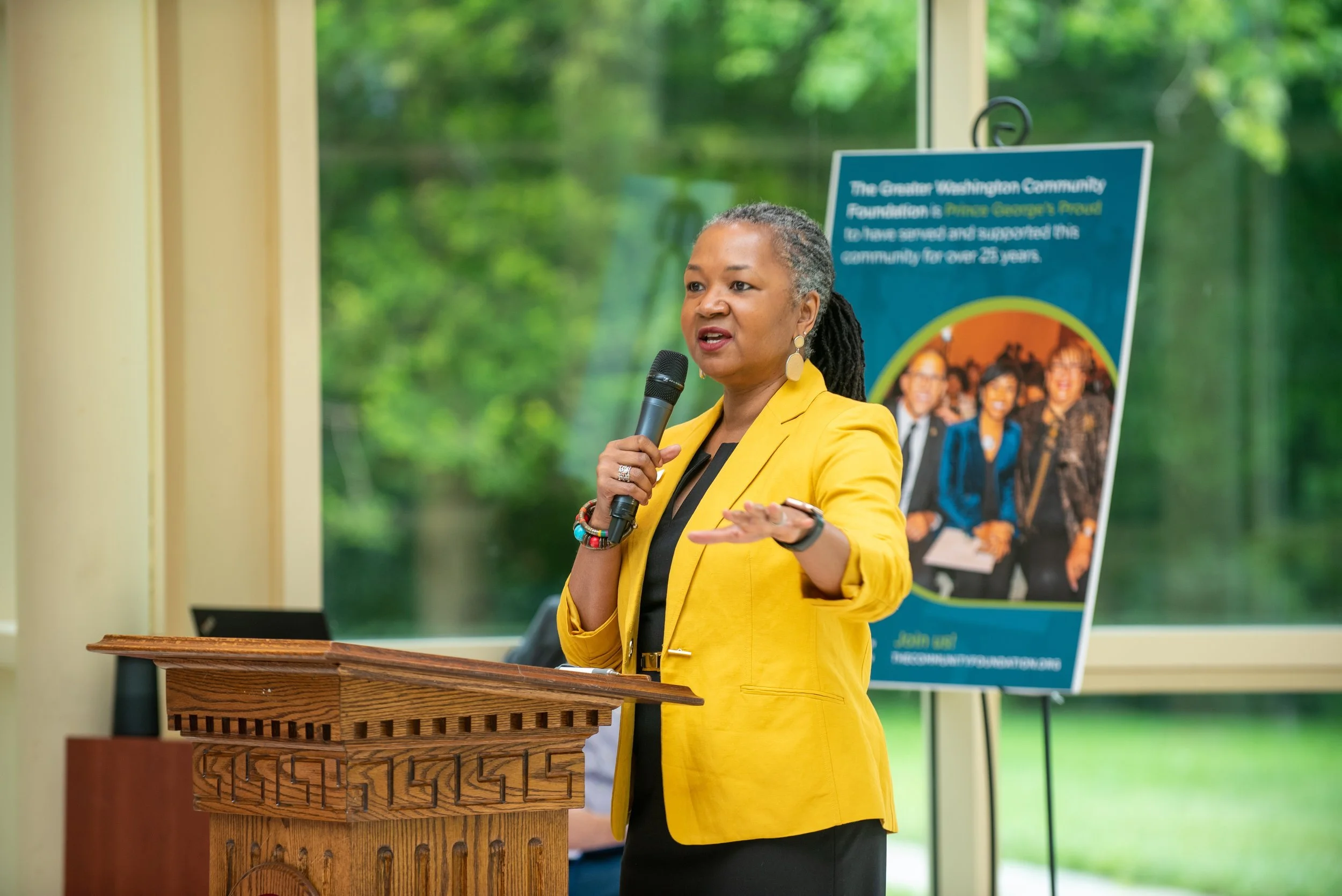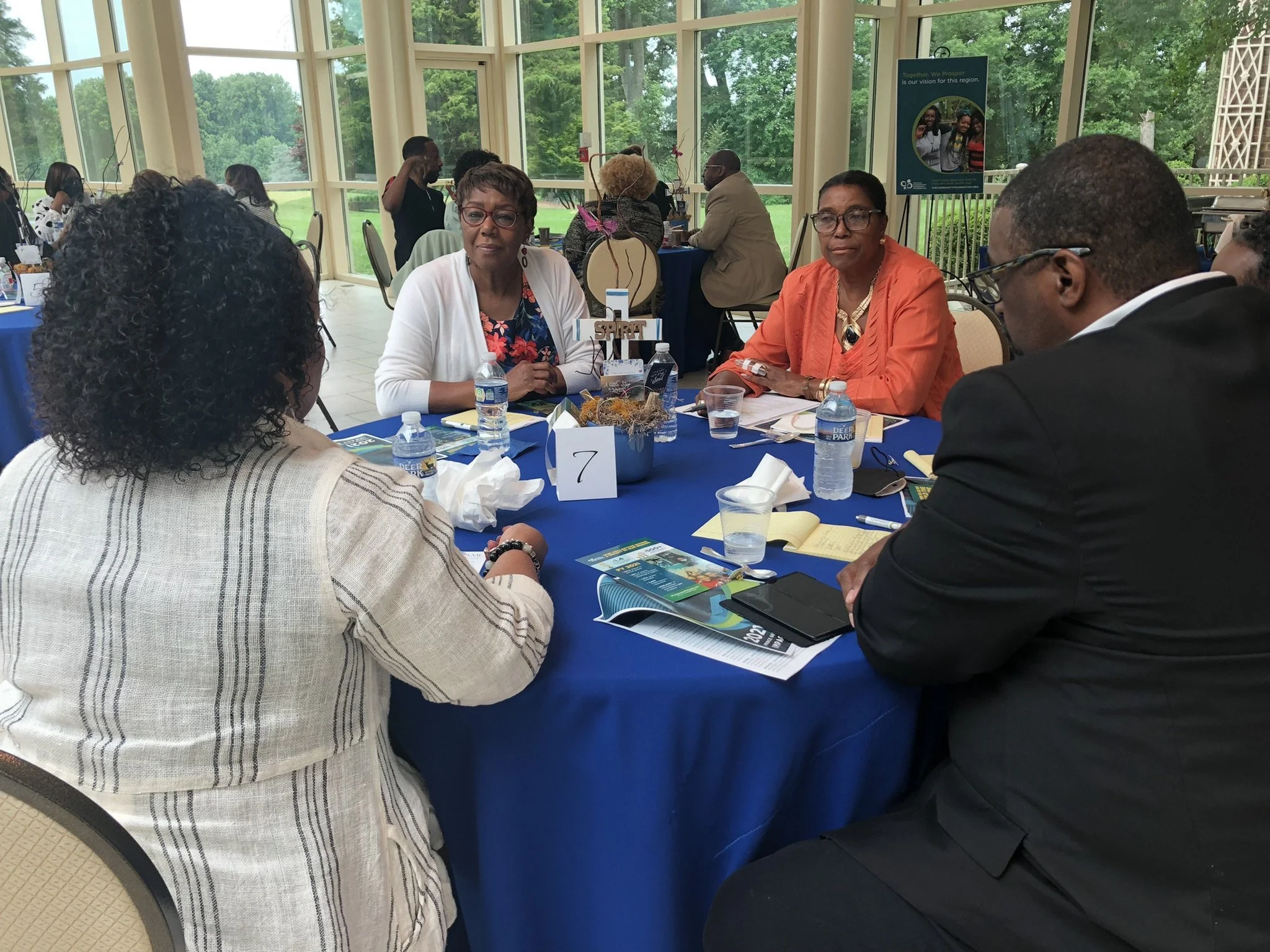The Power of Faith & Philanthropy
The following article was published for the upcoming edition of PG Suite Magazine.
By Jamie McCrary
Throughout our nation and region, Black and Brown people continue to experience deep racial and economic disparities. This injustice is particularly prevalent in Washington, DC, where White residents have 81 times the amount of wealth as Black people – a disparity exacerbated by the fact that the larger Greater Washington region has one of the highest income gaps in the country.
Prince George’s County, Maryland, is especially vulnerable. The county suffers some of the largest disparities in homeownership and income in the region.
Rev. Ronnie Galvin, Senior Fellow at The Community Foundation leads a discussion about the region’s racial wealth gap
Many local community leaders are seeking new and more focused interventions and collaborations to address these deep disparities. For the Greater Washington Community Foundation, this means forging new partnerships that help advance economic justice in Prince George’s County—efforts guided by the foundation’s vision to close the region’s racial wealth gap by igniting the power of philanthropy. The foundation’s evolving collaboration with faith-based institutions in Prince George’s County is a significant step forward in fulfilling these goals.
“The faith community offers the kind of community building, leadership, and infrastructure necessary to achieve economic justice,” said Rev. Ronnie Galvin, Senior Fellow at The Community Foundation. “Some would argue it's the last type of infrastructure that affords Black people the opportunity to determine their destinies.”
““Faith institutions are among our most vital and proactive partners in our strategic efforts to increase philanthropy and close the racial wealth gap,””
A Legacy of Social Justice
The faith community has led efforts to advance social and economic justice for well over a century, a legacy that initially inspired The Community Foundation’s collaboration.
This tradition extends back to the Civil War when Black churches offered safe haven stops on the Underground Railroad. Mutual aid societies, which predate traditional philanthropic institutions,also grew out of thechurch experience. These groups provided for the health, education, and training of the community – and their philanthropy continues to this day.
As a majority Black jurisdiction, this legacy is particularly strong in Prince George’s County where faith leaders help drive community development by funding schools, businesses, and social programs – all efforts which help advance residents’ economic mobility.
“Faith institutions are among our most vital and proactive partners in our strategic efforts to increase philanthropy and close the racial wealth gap,” said Tonia Wellons, President & CEO of The Community Foundation.
Last summer, The Community Foundation helped expand this legacy of social justice, officially launching its partnership with the Prince George’s faith community. Dubbed the Faith and Philanthropy Project, the initiative brings together faith leaders from across the county to explore how greater coordination and collaboration can help advance shared goals around philanthropy and community development.
“It’s not a question of whether we should be involved, but how,” said Rev. Kendra Smith, GO Lead of Kingdom Fellowship AME Church and Executive Director of Kingdom Global Community Development Corporation. “And where we can make the greatest impact.”
The Legacy Continues
The “Faith and Philanthropy Project” formalizes both The Community Foundation and the Prince George’s faith community’s continued commitment to improve residents’ quality of lives – and work together to close the racial wealth gap.
In its overarching vision to advance philanthropy and economic justice in the county, the Faith and Philanthropy Project will:
Increase and leverage resources to achieve greatercommunity impact;
Improve the prospects for wealth building as a means of closing theracial wealth gap;and
Amplify thevoices of community residentsto affectchange.
Dr. Bobby Manning, President, Collective Empowerment Group and Senior Pastor Frist Baptist Church of District Heights, gives remarks and opening prayer at the inaugural Faith & Philanthropy Breakfast.
As spiritual, educational, and moral hubs, Galvin emphasizes the unique role the faith community has in amplifying community voices in particular.
“If we are going to close the racial wealth gap and achieve economic justice, the voice of the faith community must be amplified,” Galvin said. “Whether Christianity, Judaism, Islam, or Buddhism, all religions call for the confrontation and transformation of unjust systems that undermine the lives of people and communities.”
When reflecting on the partnership, Dr. Bobby Manning, Senior Pastor of First Baptist Church of District Heights and leader of the Collective Empowerment Group, a consortium of member churches for economic empowerment and a key partner of the Faith and Philanthropy Project, agreed.
“I see faith-based institutions as general hubs for personal empowerment in our community,” said Dr. Manning. “Our responsibility is not only spiritual empowerment, but economic strength, civic engagement, and caring for the entire well-being of the person.”
Inspiring Public Imagination
As the project evolves, the foundation and its partners are exploring a framework for how to discuss economic justice and build philanthropy. Ultimately, Galvin envisions developing material that houses of worship can use to guide conversations with their congregations and others.
He hopes this approach will provide a cohesive way to talk about economic justice and philanthropy – and inspire social and economic change across the county.
“It’s not just about influencing public opinion; it’s also inspiring public imagination,” Galvin said. “It’s getting people to ask, ‘What does a moral economy really look like, and what will it take to get there?’”
Eventually, Galvin notes more county residents could also be on the frontlines of advocating to change longstanding issues like reparations or employee-owned businesses. He sees the foundation’s new partnerships as only fueling this possibility.
“The church is an amplifier – an invitation mechanism,” Galvin said. “And in some cases when they have the assets, they can also be part of the process to model the economy we want to see. We can't move an agenda like ours, as aspirational as it is, without communities of faith.”
Through the Faith and Philanthropy Project, the foundation aims to continue examining ways to advance economic justice through philanthropy. Disparities may run deep in our region, but The Community Foundation and its faith partners are committed to reimagining a region where we all can prosper and thrive.
Click here to view the original article! For additional information visit the PG Suite Magazine website.






